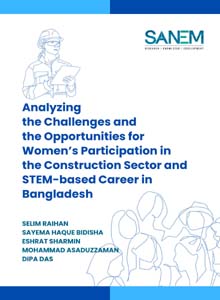Analyzing the Challenges and the Opportunities for Women’s Participation in the Construction Sector and STEM-based Career in Bangladesh
 Citation: Raihan, S., Bidisha, S. H., Sharmin, E., Asaduzzaman, M., and Das, D. (2025). Analysing the Challenges and the Opportunities for Women’s Participation in the Construction Sector and STEM-based Career in Bangladesh. SANEM Publications, Dhaka, Bangladesh.
Citation: Raihan, S., Bidisha, S. H., Sharmin, E., Asaduzzaman, M., and Das, D. (2025). Analysing the Challenges and the Opportunities for Women’s Participation in the Construction Sector and STEM-based Career in Bangladesh. SANEM Publications, Dhaka, Bangladesh.
There is no denying that women’s economic empowerment is crucial for achieving Sustainable Development Goals related to gender equality, poverty eradication, decent jobs or as a whole for inclusive growth. This study, in the context of Bangladesh, attempts to understand the potentials for economic empowerment of women by boosting female participation in the construction sector and STEM-based fields. Despite progress in many fronts, Bangladeshi women face a wide range of constraints to untap their potentials in the labour market and are found to lag far behind men, not only in terms of mere participation but also in the context of quality of employment with concentration in low-skilled, low-paid and informal jobs. Our study suggests that both STEM education-based jobs as well as jobs in the construction sector can help to boost women’s participation in income-generating activities by a significant margin. Utilizing a mixed-method approach, the research reveals that low female participation in construction and STEM-based jobs is primarily due to skill gaps, informal employment practices, and insufficient policy support. It highlights the importance of government initiatives for a greater degree of inclusion of women but at the same time also emphasizes the gap in its effective implementation. Key findings indicate a stark gender disparity in STEM education and related careers, primarily due to a wide range of socio-cultural barriers as well as disparities in rural vs. urban areas. The study emphasizes the need for comprehensive reforms, better educational programs, and industry-academia collaboration to enhance women’s participation in relatively unexplored areas, like those of construction and STEM-based activities. To address these issues, recommendations include social awareness campaigns, improved educational infrastructure, curriculum revisions, fostering public-private partnerships, amongst others. Drawing on international examples to promote gender inclusivity in traditionally male-dominated sectors, the paper also emphasizes the need for coordinated policy measures and strategic interventions.
